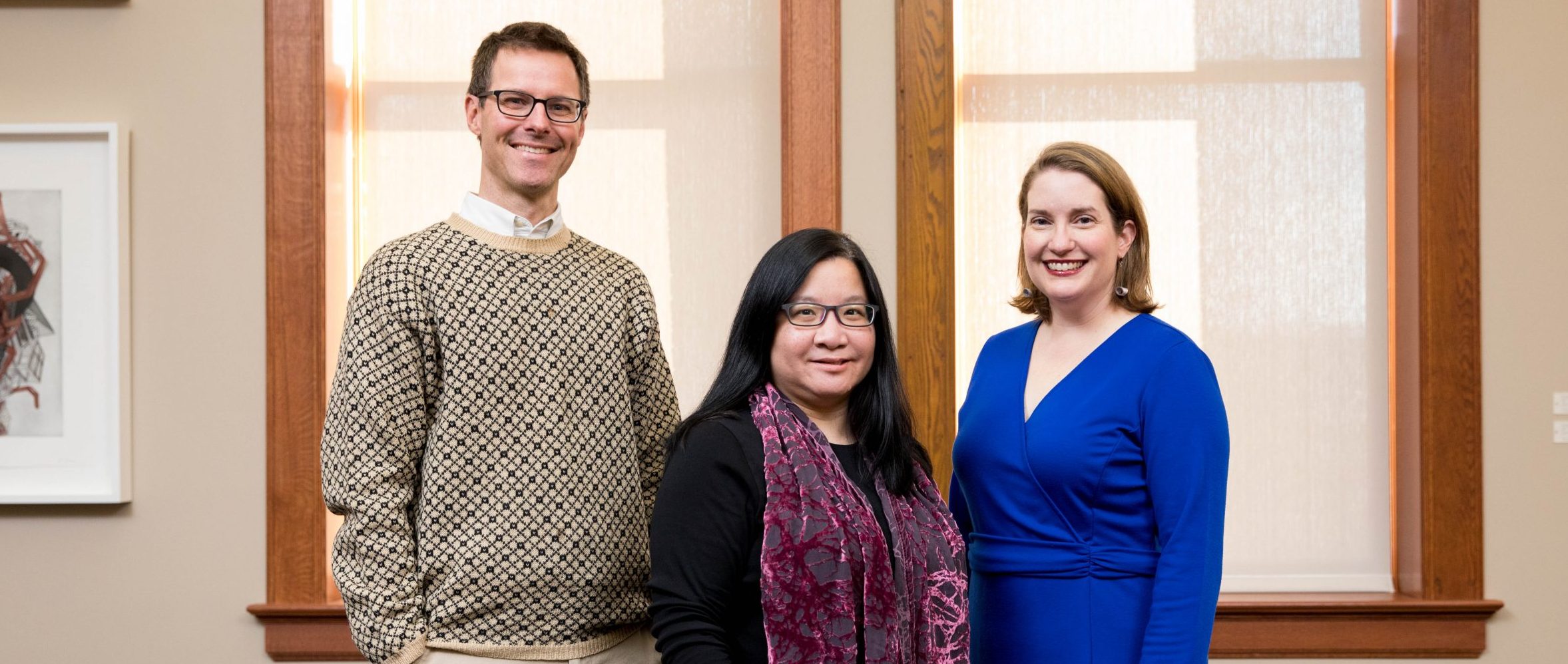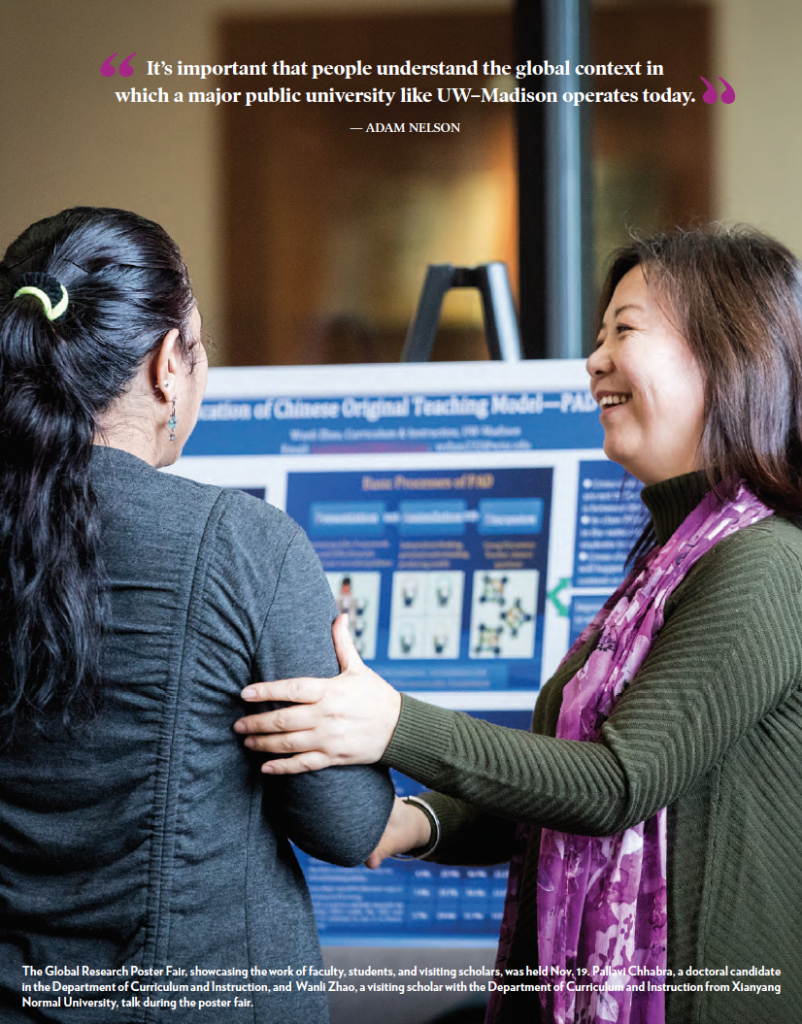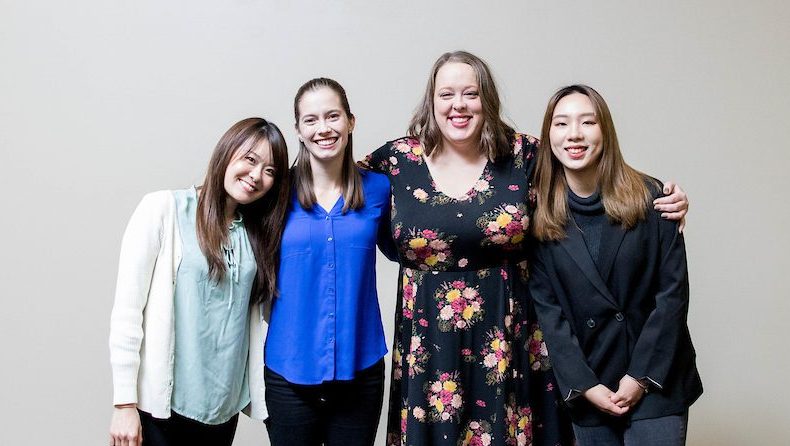
Ask Li-Ching Ho about her background and research interests, and it’s easy to start thinking of her as an expert in “global education.”
Similarly, it doesn’t take long to understand why she was named co-director of the UW–Madison School of Education’s new Global Engagement Office in June.
Ho, who is an associate professor with the Department of Curriculum and Instruction, grew up in Singapore before moving to the United Kingdom for college and majoring in international relations at the London School of Economics and Political Science. After teaching geography and social studies in Singapore for several years, she made her way to New York City, where she earned a Ph.D. in social studies education in 2008 from Teachers College at Columbia University.
After returning to Singapore and working for six years as a faculty member at the National Institute of Education at Nanyang Technological University, Ho returned to the United States in 2014 to join the faculty at UW–Madison as an assistant professor of social studies education.
Her research, conducted primarily in East and Southeast Asia, focuses on global issues of diversity in civic education, equitable access to high quality citizenship education, and environmental citizenship education. Ho has also worked closely with scholars, teachers, and students in China, Japan, South Korea, Singapore, Brunei, and the Philippines.
But ask Ho to expound on the value of her “global research,” and she pauses before pushing back.
“My work isn’t ‘global research,’ it’s just research,” says Ho. “The longer I’m here the more strongly I feel about this. There should not be, for example, global social studies research and U.S. social studies research. I’m hoping to change how people think about this.”
Ho adds: “There are so many shared problems that are common across national and cultural contexts, that doing research in different parts of the world contributes to deeper and richer conversations about how we can address persistent and significant education questions. We have to break out of these containers.”
Building on a tradition of global connectedness
While global connectedness is a cornerstone of UW–Madison’s highly ranked School of Education and its scholarly community, in 2016 Dean Diana Hess identified this realm as a vital area of interest for the School.
Nancy Kendall, a professor and current chair of the Department of Educational Policy Studies, and Kate McCleary, now the associate director of the Global Engagement Office, were selected by Hess to lead a deep dive and strategic planning process that led to the development of a Global Education Strategic Plan.
The Global Engagement Office (GEO) was born out of this process and launched in September 2018, with Ho and Adam Nelson, a Vilas Distinguished Achievement Professor with the Department of Educational Policy Studies, named co-directors in June 2019.
The GEO is a home for connecting faculty, staff, and students with resources, knowledge, and support to engage in and carry out globally focused initiatives. These efforts are inclusive of work with immigrant, migrant, and refugee communities, as well as tribal nations.
“I am thrilled that we have a new Global Engagement Office with such outstanding leadership,” says Hess, who holds the Karen A. Falk Distinguished Chair of Education. “The GEO will work to ensure that our undergraduate and graduate students, staff, and faculty have opportunities for meaningful learning and interaction with people from around the world.”
Guided by the Global Education Strategic Plan, the new office is centering its work on:
- Supporting efforts within the School to pursue study abroad, global internships, and fieldwork outside of the U.S., and working with faculty and departments to lead study abroad programs
- Cultivating a School of Education community in which international students and visiting scholars find the support needed to flourish in Madison
- Ensuring a global perspective is integrated in the School’s coursework and programs, and that all 10 departments and units are able to create programs open to students and visitors outside of the United States
- Managing the School’s institutional partnerships
“Through an enhanced emphasis on study abroad, more partnerships with universities in other nations, more opportunities and support for international research, and activities and support for international students and fellows, the new Global Engagement Office will undoubtedly strengthen our historic emphasis on global connections,” says Hess.
‘Clean eye’ approach to education

Faisal Abdu’Allah, an associate professor with the School of Education’s Art Department, is an internationally acclaimed artist who grew up in the United Kingdom as the child of Jamaican immigrants.
He still remembers the first time he went to Jamaica, as a 5-year-old, to visit family. At the time, much of what he knew about Jamaica was via media outlets, such as the BBC.
“The information I had heard was extremely skewed,” says Abdu’Allah. “Jamaica was not being presented in a positive light.”
As a child, Abdu’Allah recalls getting off the plane at the airport in Kingston and “seeing the beautiful blue sky and smelling the aroma of the island from its own natural spices. I realized at a young age that places smell different and it was a sensory thing. I also came to learn that kids enjoy walking in bare feet because they love having the warm concrete and ground against their feet. Within two weeks I wanted to be like the kids in Jamaica.”
In an effort to bring similar transformational experiences to students at UW–Madison, Abdu’Allah this summer is leading a two-week study abroad course called, “UW Exploring Cuba Through Art.”
Based in Havana, it will allow students to experience the history and culture of Cuba and give them the opportunity to expand their global consciousness and intercultural appreciation via creative journal making. Students will take guided walking tours through Havana neighborhoods, historical locations, museums, galleries, and academic institutions.
In particular, Abdu’Allah will challenge students to understand Cuba through the senses, journaling about smell, taste, touch, sight, and sound.
“One day we’ll experience Cuba through taste, and all you do is describe all the different tastes you had,” he says. “And then do the same through smell. What’s different about the aroma, the smell of the island?”
Students can record what they are sensing via writing, photos, video, and drawings, and when they return to Wisconsin will showcase their work in an exhibition.
“I’m hoping travel opens them up to what I call this ‘clean eye’ approach, where we pull back all that we think we know about a place or its people and look at it in new ways,” says Abdu’Allah. “Travel opens the mind.”
Expanding partnerships abroad
Nelson, the Global Engagement Office’s co-director, recalls his first visit to China in 2007 and the impact it had. In particular, he was amazed after touring the newly constructed campus of Zhejiang University in Hangzhou.
“It was as big as UW–Madison and had been erected in just over two years,” he says. “In multiple visits over the following dozen years, I watched as Zhejiang province invested — while the United States was disinvesting in higher education — and I felt like I’d seen the future.”
That experience and others like it led Nelson to co-establish the UW–Peking University Workshop on Higher Education and, last year, the UW–Zhejiang University Workshop on History of Education.
UW–Madison Chancellor Rebecca Blank and Peking University President Hao Ping helped open the conference on international higher education held in Beijing May 25–26, 2019.
“The U.S. and China need each other,” Blank said in her opening remarks at the fifth UW–Peking University Workshop on Higher Education. “And our universities need each other. We both have things to bring to the table. It is a bilateral relationship: we both need to educate our country’s top students to live and work in a global economy; we both need to create opportunities for our country’s top scholars to learn from each other and conduct research together.”
The higher education workshop is an annual series that alternates between Beijing and Madison. Participating in the 2019 event were faculty members from multiple universities across China, along with educational leaders from the U.S. and Europe. The theme of the May conference was “Rethinking Regional-International Inquiry in the 21st Century.”
Blank and Hao signed a two-year memorandum of understanding (MOU) that encourages student and faculty exchanges in the universities’ respective schools of education and continues a commitment to hosting the annual workshop, which will be held in Madison in 2020.
After signing the MOU, Blank presented Hao with a photo of the 20 Peking University alumni who are currently UW–Madison faculty members.
“It’s important that people understand the global context in which a major public university like UW–Madison operates today,” says Nelson. “We must continue to reach out and learn with and from colleagues across the world.”
Innovation across borders
School of Education faculty, staff, and students are consistently making connections and getting involved with creative endeavors, scholarship, and research in locations around world.
Lesley Bartlett, a professor with the Department of Educational Policy Studies (EPS), this fall was awarded a grant to collaborate with colleagues abroad on a research project that will examine how policies and programs for early grade reading instruction compare across countries.
Bartlett is an anthropologist who works in international and comparative education, a field in which the School is highly regarded. This work is designed to prepare researchers, teachers, and planners who are interested in education across nations and cultures.
Bartlett’s project, funded via the International Network of Education Institutions (INEI), allows her to work with two professors at the University of São Paulo, Brazil, and another at the University of Cape Town, South Africa. The INEI represents 10 leading education universities from around the world.
“In each country, debates over how to teach reading have been heated, though the discussions vary in telling ways,” says Bartlett.
In the mental health realm, Professor David Rosenthal with the Department of Rehabilitation Psychology and Special Education, leads the El Salvador Mental Health Promotion Project, which emanated from relationships developed through decades of work by the Madison-Arcatao Sister City Project. This initiative explores medical, education, and rehabilitation needs of people with chronic illness and disability, and survivors of decades of war.
In 2018 and again in 2019, Rosenthal and a team of colleagues and graduate students traveled to Central America to meet with government officials and national organizational leaders in the capital, San Salvador, as well as with representatives in the small community of Arcatao, to build on this work. The project was made possible via funding from the School of Education’s Grand Challenges initiative.
“Through our conversations in Arcatao, we learned that there is a need for spaces for people to tell their stories, voice the truths about the war, and share their lived experiences,” says Rosenthal. “By providing activities in group contexts as opposed to individualized therapies, we hope to provide an entry point to services for those who do not see mental health as a need and those who experience self-stigma related to their mental health concerns.”
In November, meanwhile, the GEO and the Wisconsin Center for the Advancement of Postsecondary Education partnered to host a Global Research Poster Fair to showcase School of Education faculty, student, and visiting scholar research during International Education Week.
Such examples are only the tip of the proverbial iceberg in all the efforts the School is involved in across the arts, health, and education.
“The poster fair is an example of one way the Global Engagement Office seeks to bring researchers doing globally focused work into conversation with each other, and opening the door for others to learn more about their work,” says McCleary.

An intercultural learning community
Going abroad certainly isn’t the only way to learn about diversity of perspectives or hear about a range of experiences.
“We are so fortunate to be at a university and in a community where there are individuals from around the world,” says McCleary. “It is important to recognize that we can all learn and grow from the diversity of perspectives and experiences of others around us.”
During the fall 2019 semester, there were 25 international visiting scholars within the School of Education, while 291 international students were pursuing undergraduate and graduate degrees within the School.
One example of making the most of this intercultural learning community is the Global Higher Education (GHE) master’s program — which is purposely comprised of a mix of international students and those from the United States. The GHE is administered through the Department of Educational Leadership and Policy Analysis, and led by Weijia Li, a native of China who has studied in Germany and the United States.
Li says it’s imperative that institutions prepare leaders and researchers for our rapidly changing world. GHE is designed to give students the global competencies they need to think critically and help solve issues in this realm.
Another unique aspect of GHE is that it’s a cohort program, which brings 15 to 20 students together to conduct much of their coursework collectively.
“When I was trying to find a master’s program that was the right fit, Dr. Weijia Li said something that stuck with me,” says Emily Pinderski, who grew up in the Chicago suburbs before majoring in political science and French as an undergrad at the University of Miami. “He said I’d be learning from the people in my cohort just as much, if not more, than I’d be learning from my professors. I recognized this was an incredible opportunity.”
Li adds that while the coursework itself is important, it’s the interaction between, and perspectives of, the students that plays an integral role in bringing a range of views to the table and helping students learn and grow.
“It’s an amazing cohort and great to learn about the different experiences people have,” says Lingtong Yu, who grew up in China and earned an undergraduate degree in elementary education from the University of Minnesota. “Even being an international student, being a part of this cohort is allowing me to hear and gain new experiences.”
Transformation through an expanded world view
At the heart of the School of Education’s renewed focus on global connections is a belief that these efforts can provide meaningful learning and interaction that drive how people conceptualize and seek solutions to problems we are facing locally, nationally, and globally.
“This work not only can provide a different point of view — but it can help us reframe issues in different and more productive ways,” says Li-Ching Ho, the co-director of the GEO.
To help put the value of intercultural work in perspective, McCleary notes how she often uses the analogy of an iceberg to help people think about cultural difference.
“There is the small part of the iceberg that you can see above the water that is the expected differences,” she says. “But there is the much larger piece of the iceberg that lies below the water and is much more difficult to see and decipher, such as differences in systems, structures, and values. Accessing the understanding below the surface is something that takes time, patience, openness, empathy, and cultural humility. Spending time in other places or learning with colleagues from around the world allows one to understand things in a way that reading, searching the web, or watching a YouTube video or documentary never can.”
Indeed, one of the guiding principles of the Global Engagement Office is the value of a global lens. “If education isn’t global, it’s not education,” says Abdu’Allah. “If I’m preparing my students to be successful, I have to set them up to think as citizens of the world.”
To gain an appreciation for the Global Engagement Office and the depth and breadth of its efforts, visit: global.education.wisc.edu